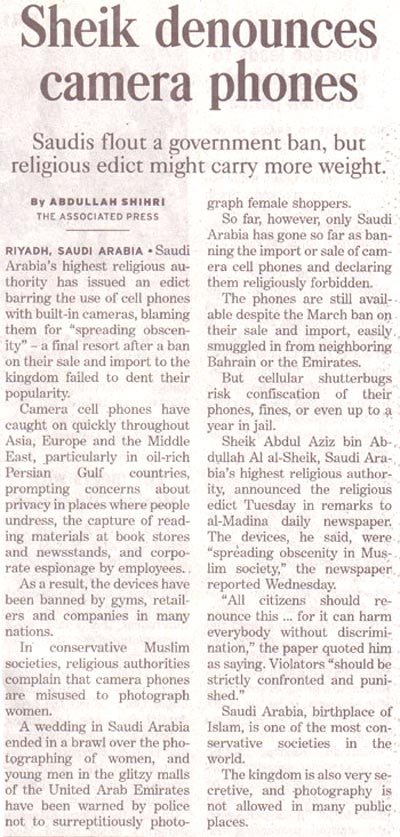
MUSLIM HATE FOR CELL PHONE WITH CAMERAS
PAKISTAN: A young woman stoned to death for having a cell phone after ruling by a Panchayat
July 11, 2013
Asian Human Rights Commission
Arifa, a mother of two, has been stoned to death on the orders of
Panchayat (a tribal court) for possessing a cell phone. She was
executed on 11 July in the district of Dera Ghazi Khan in Punjab
province. The victim was stoned to death by her uncle and relatives on
the orders of Panchayat after she was found to have a mobile phone.
According to media reports her uncle, cousins and other relatives threw stones and bricks at her until she died. She was buried without informing anyone. Police registered a First Information Report (FIR) against the Panchayat but no one has been arrested. She was buried in a desert far away from her village and nobody (not even her children) was allowed to participate in the funeral. Her husband is unknown.
Women are often victimized by these illegal judicial systems. This incident is a demonstration of the strong patriarchal society in Pakistan, and women are forced to remain in their clutches. Because of the absence of a proper criminal justice system, the powerful sections of society have complete impunity when they enforce their will.
The incident is a clear reflection of the total collapse of the rule of law in the country, where every section of the government has become utterly redundant in the face of tribal, feudal and religious traditions. The local police have not arrested the members of the Panchayat because the power in the area lies with the landed aristocracy.
Stoning to death is a barbaric act from a primitive society. Society is sent the message that violence is the way to deal with women and other vulnerable groups. Women's rights are negated through the use of these forms of punishment.
Pakistani society has degenerated to the point that, for a woman, keeping a cell phone has become serious crime. It is treated as a worse crime than gang rape, murder and bomb blasts, through which many people are killed on a daily basis.
The Panchayat is an illegal judicial system run by feudal lords and tribal leaders. It is common in rural areas of Punjab, where landed aristocracy and centuries old tribal traditions rule. These practices are commonly used against women so that their tribal norms remain pure and intact. The Panchayat system is so powerful that the 'independent judiciary' still has not shown the courage to declare it illegal. The Pakistani judiciary, which got its independence after a people's movement of two years, is much more involved in taking cases against elected government officials in order to keep its popularity in the media, while failing to introduce judicial reforms at the grassroots level, which has generated a society without any base on the rule of law.
What
Arifa's death shows us is the real system of justice in many parts of
Pakistan. Local ruling is done by feudal bodies with complete impunity.
There is no enforcement of the law by the judiciary, police or any
other governing institution. It is more than the absence of the rule of
law; it is an airless vacuum claiming many victims, in which the police
– charged with the duty of enforcing the law - are hired thugs who
torture and detain people at the request of powerful parties.
In Arifa's case, it is those same corrupt police officers who are now
being asked to investigate. Without serious intervention from
government authorities, her case will be treated the same as far too
many innocent deaths have been; uninvestigated, with complete impunity
for the perpetrators.
The Panchayat, Jirga and other illegal 'judicial systems' can easily be used by grudge informers and powerful persons to obtain 'death penalties' to murder whomsoever they want to. Bizarre charges can be tried and people are executed through these systems. There is rarely any intervention by the police to stop them because the police, as mentioned above, play a particular part in the real legal system that operates in many parts of Pakistan.
The
Asian Human Rights Commission (AHRC) urges the parliament to legislate
against the illegal tribal courts, including the Jirga, Panchayat and
Bradari judicial systems. The government must immediately investigate
and arrest all the members of the Panchayat for ordering the murder of
a woman on the charges of possessing a cell phone. The senior police
officers for the district of Dera Ghazi Khan should also be prosecuted
for aiding and abetting this heinous crime and neglecting their duty to
investigate this case. The upper judiciary, particularly the Supreme
Court of Pakistan, must take immediate action against illegal and
parallel judicial systems and the killing of innocent people.

CURSED ARE THE PICTURE MAKERS!
Volume 3, Book 34, Number 299:
Narrated 'Aun bin Abu Juhaifa:
My father bought a slave who practiced the profession of cupping. (My father broke the slave's instruments of cupping). I asked my father why he had done so. He replied, "The Prophet forbade the acceptance of the price of a dog or blood, and also forbade the profession of tattooing, getting tattooed and receiving or giving Riba, (usury), and cursed the picture-makers."